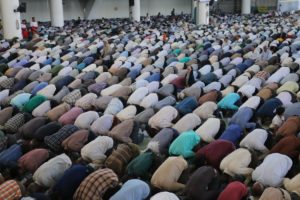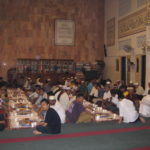Islam places great importance on our relationship with the Creator and the fellow humans around us without any prejudice. Islam divides these rights into two important segments of a) “Rights of Allah (Huqooq Allah)” and b) “The rights of people (Huqooq Al-Ibad).”
Islam has laid down universal fundamental rights for humanity as a whole, which are to be observed and respected under all circumstances whether an individual or a group is residing within the territory of the Islamic state or outside, whether in time of peace or at war, Muslim or non-Muslim.
Basic rights that Islam ordains its followers
Following are some of the basic rights that Islam ordains its followers in roles of authority and or commoners to provide ALL PEOPLE living under its rule or authority and or around them.
1. The “Right to Life”
2. The Right to “Safety and Security of Life & Property”
3. Respect for the “Chastity and Honor of Individuals, Especially Women”
4. The Individual “Right to Freedom of Speech & Expression”
5. The Right to “Seek and Find Justice and Equality before Law”
6. The Right of “Equality of Human Beings”
7. The Right to “Co-operate and Not to Co-operate”
8. The Right to “Protest against Tyranny and Wrong”
9. The Right to “Protection of Religious Sentiments”
10. The Right of “Protection from Arbitrary Imprisonment”
11. The Right to “Basic Necessities of Life”
12. The Right to “Question Those In Positions of Authority”
13. The Right to “Question and Participate In the Affairs of State or Organization”
14. The Right of a “Neighbor/s”
I can’t go into explaining each and every one of the above as many volumes would not suffice but try to elaborate on general ideas.
 We must understand that the basic distinction and criteria of following the leadership at any level are already decided by Allah The Almighty and His Messenger (peace be upon him) when we are told that; “there is no obedience to anyone in the disobedience of the Creator.” So nobody in any role or position of authority can order any subordinate to do anything that falls in the defiance and disobedience of Allah and hurt fellow human beings.
We must understand that the basic distinction and criteria of following the leadership at any level are already decided by Allah The Almighty and His Messenger (peace be upon him) when we are told that; “there is no obedience to anyone in the disobedience of the Creator.” So nobody in any role or position of authority can order any subordinate to do anything that falls in the defiance and disobedience of Allah and hurt fellow human beings.
Much is mentioned in all the divine books of Allah The Almighty, readily available in the text of practices of all the Prophets and Messengers of Allah (peace be upon them all) and written by the scholars about the “Rights of Allah.”
Let me address the rights that people have towards each other. In one hadith, the Prophet (peace be upon him) is quoted to have said; “learn manners from the attributes of Allah”, and as the “Mercy” is the greatest attribute of Allah after His attribute of being a “One and Only Creator”, we are told to be merciful to ourselves by not committing oppression against others, as it is one of the greatest sins.
In yet another hadith the Prophet (peace be upon him) has said; “The Most Merciful is Merciful on those who are merciful to others, be merciful to those (around you) on earth and The One Merciful (present everywhere) will be Merciful upon you.” What an exceptional and beautiful concept intertwining the Creator’s rights and the rights of the creatures, all Prophets and Messengers of Allah (peace be upon them all) practiced it to their very best, and we are only to follow their example in our dealings with people around us.
Seek, provide, establish and practice Justice, Truth, and Fairness
The Glorious Qur’an states the purpose and mission of a Muslim to seek, provide, establish and practice Justice, Truth and Fairness in all roles and positions towards everyone. Islam ordains it followers to not stop at that but also “to cooperate in good and rightful causes (Al-Birr) with all people regardless of their faith or creed or any other prejudice, and refrain from cooperating in the forbidden acts regardless of faith or creed (Surah Al-Maidah 5:2)”.
One of the fundamentals that Allah taught people of all times from the day He created the heavens and earth is beautifully and eloquently repeated time and again in the Glorious Qur’an, when in Surah Al-Hujurat 49:13, Allah The Almighty ordains us to remember; “O mankind! We have created you from a male and a female, and made you into nations and tribes, that you may know one another. Verily, the most honorable of you with Allah is the one who refrains from the disobedience of Allah. Verily, Allah is All-Knowing, All-Aware.”
It is very unfortunate that the Muslim leadership at almost all levels commits the grievous travesty of justice against their own people and others. It should not be mistaken that Islam maintains relaxed criteria or a code of ethics and conduct for those in roles of leadership. On the contrary, such acts are an automatic disqualification for those to be in leadership positions.
Oppression has no role or place in Islam, it is strictly prohibited to oppress anyone whether Muslim or not. Women’s honor and chastity are to be respected under all circumstances. The hungry must be fed, the naked clothed, the wounded or diseased treated, and opportunities of education must be available without prejudice.
Discriminatory practices, pride or boastfulness by any individual, group or nation based on nationalism, color, language, ethnicity, economic status, lineage, tribe, gender, and or any other self-made difference is absolutely shunned and strictly prohibited by Allah The Almighty and the Prophet (peace be upon him).
When it comes to human rights, it may come as a surprise to some including the majority of Muslims that the longest ayah of Qur’an (Surah Al Baqarah 2:282) is about the “financial transactions” as it is usually one of the basic reasons of conflict between two people.
Equality, Justice, Truth, Fairness, Inner and Outer Peace
The Equality, Justice, Truth, Fairness, Inner and Outer Peace, and due process of rule of law without any prejudice are the primary teachings of Islam. It is a matter of fact that all Messengers and Prophets of Allah from Adam to Mohammed (peace be upon them all) were sent and appointed to provide, establish and practice justice, equality and fairness in between people towards the rights of Allah and then among mankind without any prejudice.
 For example in Surah An-Nisa 4:135, Allah The Almighty orders all the believers of all times and said; “O you who believe! Stand firmly for justice, as witnesses to Allah; even if it is against yourselves, or your parents, or your kin, be he rich or poor, Allah is a Better Protector to all than you. So do not follow the desires of your hearts, that you may avoid justice, and if you distort your testimony of truth or refuse to give it, verily, Allah is Ever Well-Acquainted with what you do.”
For example in Surah An-Nisa 4:135, Allah The Almighty orders all the believers of all times and said; “O you who believe! Stand firmly for justice, as witnesses to Allah; even if it is against yourselves, or your parents, or your kin, be he rich or poor, Allah is a Better Protector to all than you. So do not follow the desires of your hearts, that you may avoid justice, and if you distort your testimony of truth or refuse to give it, verily, Allah is Ever Well-Acquainted with what you do.”
Yet another example of the importance of truth, fairness, and justice is given in Surah Al-Maidah 5:8, where Allah the Almighty says; “O you who believe! Stand out firmly for Allah and be just witnesses and let not the enmity and hatred of others make you avoid justice. Be just: that is nearer to piety, and fear Allah. Verily, Allah is Well-Acquainted with what you do.”
The human rights in Islam are no courtesy of any man but granted by Allah and we have the obligation to establish, provide and practice human rights, and in failure to do so, we will be questioned by Allah and hold fully accountable on the day of judgment. No legislative assembly, individual or group or any government on earth has the right or authority to make any amendment or change in the rights of people towards each other let be the ruler or subject, rich or poor, Muslims or not, young or old, black or white, men or women, etc. It is an irony that there exists no Muslims government on the face of the earth today that establishes these rights given to all creatures by the One and Only Creator.
When it comes to human rights, it not a matter of choice, every Muslim individual or group, a father or mother, husband or wife, a local official or national leader who claims him/herself to be a Muslim is duty-bound by and to Allah The Almighty to accept, recognize, practice and enforce human rights or leave his position for those who may understand it better.
Conclusion
In light of the brief examples, the news that we read, hear or painfully experience from the Muslim countries, organization, groups, majority of households and individuals is disheartening, but we must continue to learn and then work on ourselves, correct weaknesses and provide positive role models.






